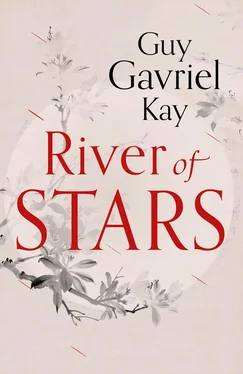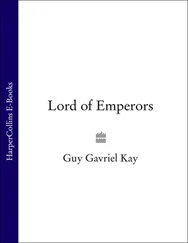It had begun raining this week, much too late, though if it continued there might be some faint promise for spring, for those who survived the winter that was coming.
Girl-children were being drowned at birth in the countryside, they’d learned in whispers. It was called bathing the infant . It was illegal (hadn’t always been, Teacher Tuan had told them), but it happened, was one of the surest signs of what was in store.
Daiyan’s father had told him that you knew it was truly bad when boys were also put into the river at birth. And at the very worst, he’d said, in times when there was no other food at all … he’d gestured with his hands, not finishing the thought.
Daiyan believed he knew what his father meant, but didn’t ask. He didn’t like thinking about it.
In fog and ground-mist, the early-morning air cool and damp, the breeze from the east, the boy slashed, spun, thrust in a bamboo wood. He imagined his brother receiving his blows, then barbarian Kislik with their shaved scalps and long, unbound fringe hair, in the war to the north.
His judgment as to the matter of what anger did to his blade skills was that it made him faster but less precise.
There were gains and losses in most things. Speed against control represented a difference to be adjusted for. It would be different with his bow, he decided. Precision was imperative there, though speed would also matter for an archer facing many foes. He was exceptionally good with a bow, though the sword had been by far the more honoured weapon in Kitai in the days (gone now) when fighting skills were respected. Barbarians like the Kislik or Xiaolu killed from horseback with arrows, then raced away like the cowards they were.
His brother didn’t know he had a bow or he’d have claimed it for himself as Eldest Son. He would then, almost certainly, have broken it, or let it be ruined, since bows needed caring for, and Ren Tzu wasn’t the caring-for sort.
It had been his teacher who had given the bow to Daiyan.
Tuan Lung had presented it to him one summer afternoon a little more than a year ago, alone, after classes were done for the day, unwrapping it from an undyed hemp cloth.
He’d also handed Daiyan a book that explained how to string it properly, care for it, make arrow shafts and arrowheads. It marked a change in the world, in their Twelfth Dynasty, having books here. Teacher Tuan had said that many times: with block printing, even a sub-prefecture as remote as theirs could have information, printed poems, the works of the Master, if one could read.
It was what made a school such as his own possible.
It had been a private gift: the bow, a dozen iron arrowheads, the book. Daiyan knew enough to hide the bow, and then the arrows he began to make after reading the book. In the world of the Twelfth Dynasty, no honourable family would let a son become a soldier. He knew it; he knew it every moment he drew breath.
The very thought would bring shame. The Kitan army was made up of peasant farmers who had no choice. Three men in a farming household? One went to the army. There might be a million soldiers, even more (since the empire was at war again), but ever since savage lessons learned more than three hundred years ago it was understood ( clearly understood) that the court controlled the army, and a family’s rise to any kind of status emerged only through the jinshi examinations and the civil service. To join the army, to even think (or dream) of being a fighting man, if you had any sort of family pride, was to disgrace your ancestors.
That was, and had been for some time, the way of things in Kitai.
A military rebellion that had led to forty million dead, the destruction of their most glittering dynasty, the loss of large and lucrative parts of the empire … That could cause a shift in viewpoint.
Xinan, once the dazzling glory of the world, was a sad and diminished ruin. Teacher Tuan had told them about broken walls, broken-up streets, blocked and evil-smelling canals, fire-gutted houses, mansions never rebuilt, overgrown gardens and market squares, parks with weeds and wolves.
The imperial tombs near the city had been looted long ago.
Tuan Lung had been there. One visit was enough, he’d told them. There were angry ghosts in Xinan, the charred evidence of old burning, rubble and rubbish, animals in the streets. People living huddled in a city that had held the shining court of all the world.
So much of their own dynasty’s nature, Teacher Tuan told them, flowed like a river from that rebellion long ago. Some moments could define not only their own age but what followed. The Silk Roads through the deserts were lost, cut off by barbarians.
No western treasures flowed to Kitai now, to the trading cities or the court in Hanjin. No legendary green-eyed, yellow-haired dancing girls bringing seductive music. No jade and ivory or exotic fruits, no wealth of silver coins brought by merchants to buy longed-for Kitan silk and carry it back west on camels through the sands.
This Twelfth Dynasty of Kitai under their radiant and glorious emperor did not rule and define the known world. Not any more.
Tuan Lung had taught this to that same handful of them (never in class). In Hanjin, at the court, they still claimed to rule the world, he said, and examination questions expected answers that said as much. How does a wise minister use barbarians to control barbarians?
Even when they carried wars to the Kislik, they never seemed to win them. Recruited farmers made for a large army but not a trained one, and there were never enough horses.
And if the twice-yearly tribute paid to the much more dangerous Xiaolu in the north was declared to be a gift , that didn’t change what it really was, their teacher said, over his end-of-day wine. It was silver and silk spent to buy peace by an empire still rich, but also shrunken—in spirit as well as size.
Dangerous words. His students poured wine for him. “ We have lost our rivers and mountains ,” he sang.
Ren Daiyan, fifteen years old, dreamed at night of glory, swung a bamboo sword in a wood at dawn, imagined himself the commander sent to win their lost lands back. The sort of thing that could only happen in a young man’s imagining.
No one, Teacher Tuan said, played polo, perfecting their horsemanship, in the palace or parks of Hanjin the way they had once in Xinan’s walled palace park or city meadows. Red- or vermillion-belted civil servants didn’t pride themselves on their riding skills, or train with swords or bows, vying to best each other. They grew the nails on the little fingers of their left hands to show the world how they disdained such things, and they kept the army commanders firmly under their thumbs. They chose military leaders from their own cultured ranks.
It was when he’d first heard these things, the boy Daiyan remembered, that he’d begun coming to this grove when tasks and rain allowed, and cutting himself swords. He’d sworn a boy’s oath that if he passed the examinations and arrived at court he’d never grow his little fingernail.
He read poetry, memorized the classics, discussed these with his father, who was gentle and wise and careful and had never been able even to dream of taking the examinations.
The boy understood that Teacher Tuan was a bitter man. He had seen it from the beginning of his time in the academy, a clerk’s clever younger son being taught to write properly, learn the teachings of the Masters. Clever, diligent, a good brush stroke already. Perhaps a genuine candidate for the examinations. His father’s dream for him. His mother’s. So much pride, if a family had a son do that. It could set them on a road to fortune.
Daiyan understood this. He’d been an observant child. He still was, at the edge of leaving childhood behind. Later this same day, in fact, it would end.
Читать дальше












